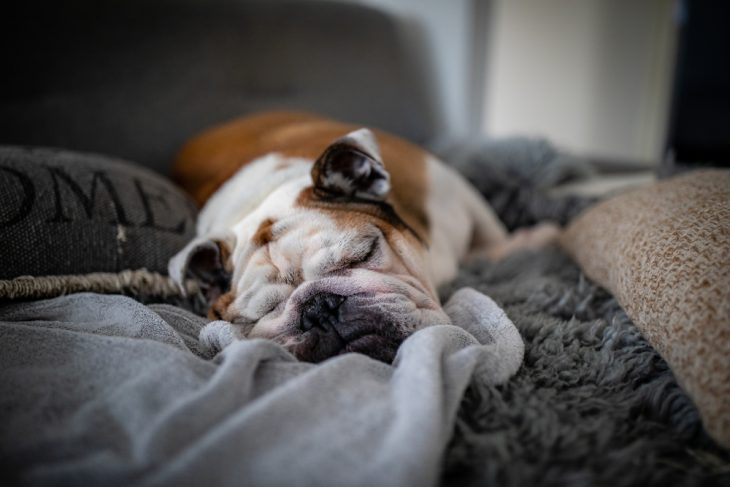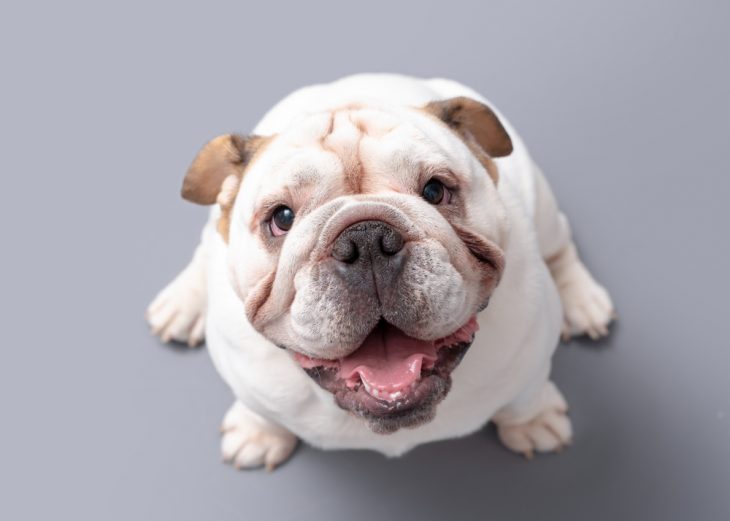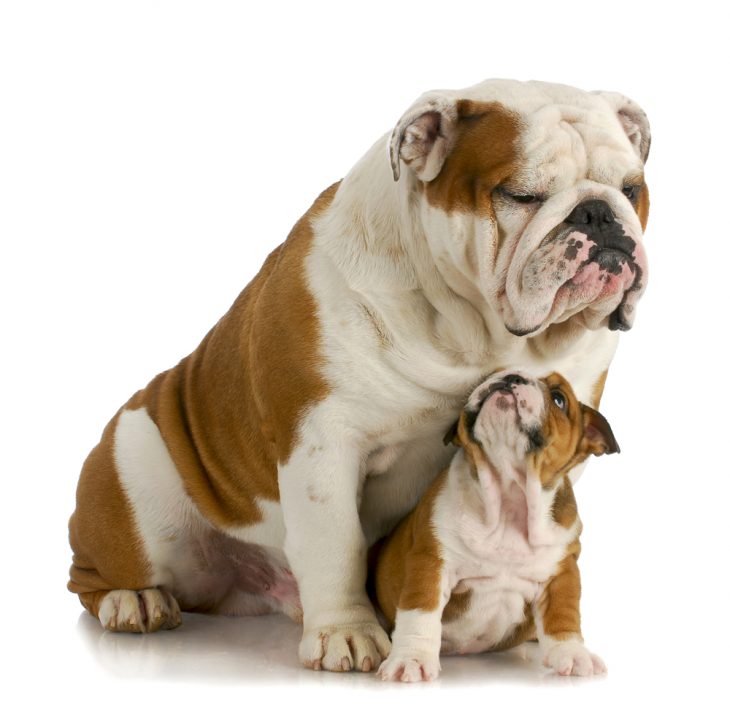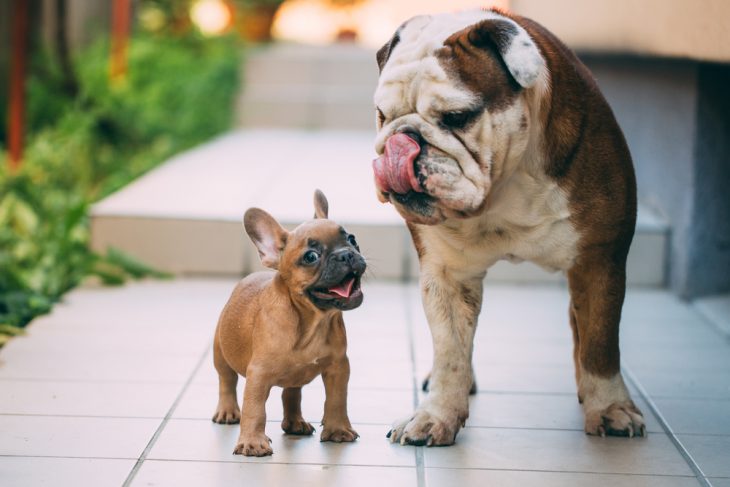15 Tips Every New Bulldog Owner Needs

Bulldogs are one of the most unique and adorable dog breeds out there. That uniqueness has its advantages and disadvantages, however, and it’s important to know both before getting a bulldog.
Bulldogs are one of the most unique and adorable dog breeds out there. That uniqueness has its advantages and disadvantages, however, and it’s important to know both before getting a bulldog.
After all, dogs can keep us company for years so it’s important to pick the right breed for you.
What are the key characteristics that make Bulldogs special?
The most distinct feature of bulldogs is their unique physique and facial structure. Some people don’t like how they look while others adore them.
That’s easy enough to distinguish, however – you either like how they look or you don’t. Certain other features are less noticeable at first but just as important. Here are some examples:
- Bulldogs live around 8-10 years on average. With the right care, they can live several years longer.
- Bulldogs are exceptionally social and affectionate.
- Bulldogs are predisposed to certain health problems so you’ll need to take good care of your pup.
- Bulldogs are great with kids and other pets if you socialize and train them well.
Here are the 15 things you should know before getting a Bulldog:
1. Bulldogs are incredibly intelligent as well as stubborn which can make training tricky
Most people think that if a dog breed is intelligent it’s also easy to train. That’s both right and wrong in a way.
Bulldogs are a very intelligent breed that can be taught to do many different things. But it’s that same intelligence that makes them incredibly stubborn and strong-willed dogs.
So, is this good or bad?
Well, while you can teach bulldogs to do lots of things, you’d need lots of patience and know-how if you are to be successful.
And, in the meantime, you can expect lots of silly behavior from them. Bulldogs can even be too stubborn for their own good so don’t be surprised if you see them do stuff like:
- Get stuck while trying to fit themselves in an incredibly small place – something cats are famous for.
- Insist on eating something that really isn’t right for them.
- Randomly declare war on an innocent household item that had nothing to do with them a moment ago.
2. Health-wise Bulldogs are very high-maintenance
You may have heard that bulldogs are not the healthiest dog breed and that’s unfortunately true. Because of their peculiar head and body shapes, they are susceptible to a host of different diseases and conditions. Some of the prime examples include:
- Dental problems due to bizarre jaw structure
- “Cherry eye” protrusions
- Eye cataracts
- Sleep apnea
- Ear infections
- Muzzle acne
- Enlarged tongue
- Overheating and stroke risks
- Breathing problems and hyperventilation
- Risk of choking fits
- Hyperthyroidism
- Mange
- Hip dysplasia
- Pelvic torsion
- Slipped spinal disks
- Dermatitis
- And others
Of course, the fact that bulldogs are susceptible to such issues doesn’t mean that your bulldog will develop them. Instead, it means that you’ll have to take very good care of your pet – adequate food, exercise, supplements, and regular vet check-ups are a must with a bulldog!
3. Finding the right breeder is key
Because of the potential for health problems, it’s important to get your bulldog puppy from a reputable breeder. This will ensure that the puppy comes from healthy parents and has been raised properly.
How would you know which is the right breeder?
There are many lists of good and trusted breeders online that you can check. Alternatively, you can look at dog breeder reviews in your area.
After that, once you get in contact with a breeder, you should make sure that they are upfront and honest with you. Don’t hesitate to ask them questions and try to see if they are avoiding answering them.
And of course – always ask for a health certificate!
What about adopting a bulldog from a shelter?
This is also a possibility if you’re strapped for cash or if you just don’t like the idea of buying a puppy when there are thousands already up for adoption.
The problem with getting a bulldog from a shelter or a rescue is that you can’t be as certain about the dog’s health.
Still, well-run shelters and rescues often provide health certificates and adequate health info. They also take good care of their animals. This ensures that you’ll either get a healthy animal or you’ll at least be well-informed about its health risks and conditions.
4. Bulldog puppies can be surprisingly energetic
People who’ve never owned a bulldog often view this breed as lazy and lethargic. And while it’s true that adult bulldogs are not as physically active as other dog breeds, bulldog puppies can be surprisingly energetic.
It should go without saying that young pups are full of energy but a lot of new bulldog owners get surprised by that.
What does that mean?
The combination of near-unlimited energy and an intelligent & stubborn temperament can make bulldog puppies quite the handful. And that’s not necessarily a bad thing. In fact, bulldog puppies are a lot of fun!
However, you should be mindful of that before getting your bulldog puppy. If you don’t have enough free time and energy for your new pup you may get overwhelmed.
5. The dogs from this breed are very loyal and defensive of their family
Most dog breeds are known as loyal and loving toward their families but this goes doubly for bulldogs. This makes them an incredibly dependable breed – unless you mistreat it, your bulldog will always be by your side and will always be willing to help you out.
There are some drawbacks to this, however:
- Bulldogs can be aggressive toward strangers if they’re not socialized properly. This means that you’ll need to go the extra mile to teach your bulldog to trust strangers and visitors.
- Bulldogs often need to be taught not to bark. Because they feel the need to protect you, bulldogs often have the urge to bark not just at strangers but even just at outside noises. This can be annoying not just for you but for your neighbors too. So, it’s important to teach your dog not to bark as soon as possible.
- Bulldogs can be a little jumpy. This is as much out of fear as it is due to their instinct to react to anything that might threaten their family.
Be careful not to “reward” such jumpiness with too many hugs in an attempt to calm down your bulldog too – this will only signal the dog that there is something to be afraid of.
Instead, when the bulldog sees that you’re ignoring certain sounds, it will learn to ignore them as well.
6. Bulldogs’ respiratory issues make for some very loud snoring
One of the signature features of bulldogs is their flat face. But while it is incredibly cute, it also leads to certain problems.
Breeds with such flat noses are called brachycephalic dogs. With pretty much all of them, this unique facial structure is due to the way they were bred over the years. And with all of them, it has two negative side-effects:
- The potential respiratory health problems we mentioned above.
- Lots of snoring!
Sure, the latter sounds much less problematic than the former. And it is! But the extra loud snoring and snorting are still important to keep in mind
Why?
Because if you’re the type of person who wants their dog to sleep in the bedroom with them, you’d either have to buy some earplugs or go for a dog breed that doesn’t snore.
7. This breed is extremely social and requires near-constant human presence
A common misconception is that all dog breeds are social. That’s not exactly true.
Sure, all dogs are more social than cats but there are still dog breeds that are much more individualistic than others.
Bulldogs aren’t one of those breeds, however. If you want a dog that’s constantly craving your attention – get a bulldog!
Bulldogs always want to be near you, they always love sleeping on you, they love getting pets and belly rubs, and they adore any type of attention and pleasant physical interaction.
Is there a downside to this, however?
Unfortunately, yes.
This hyper-social mentality of bulldogs makes them ill-suited for people who spend lots of time out of the house.
If you’re not working from home and you tend to work long hours, getting a bulldog puppy may mean dooming it to a lonely and unhappy life. Instead, bulldogs are best-suited for people who work from home.
What can you do if you don’t work from home but you really want a bulldog?
There are several possible solutions:
- Make sure there’s (almost) always a family member at home – it can be a child, an older relative, or a spouse who works from home.
- Hire a dog sitter or a dog walker for when you’re at work – there are many such services in the U.S. and they’re often relatively affordable.
- Make sure you give your bulldog enough attention when you’re home – playing with, hugging, and petting your bulldog as much as possible before going to work will ensure that the dog won’t miss you that much.
- Don’t stay out that long. Working out of home is one thing but there’s a difference between being out for 6-8 hours a day and being out for 12-16 hours. The former may be ok for a bulldog if you give the dog enough when you’re home but the latter is a big No-No.
- Get your bulldog a second canine buddy. Having two dogs instead of one may seem like lots of extra work but in many ways, it’s the opposite. If you have two dogs, they’ll keep each other company and won’t get bored. A bored dog is a dog that takes out its frustration on your couch. And a dog with a buddy is a dog that doesn’t get bored.
8. Bulldogs don’t need too much physical exercise
Many dog breeds require lots of physical activity. This is often a turn-off for would-be dog owners as most people don’t have the time for constant walks in the park and playtime in the yard.
Fortunately, bulldogs are not one of those breeds.
They still need social interaction and some physical activity but an adult bulldog doesn’t need to get exhausted every day. Instead, all they need is a bit of running, a bit of ball play, and the rest can be hugs and petting on the couch.
So, if you’re looking for a dog breed that’s fun to play with but even more fun to snuggle with, bulldogs are a good choice.
There is a flip side to that, however, It’s not just that bulldogs don’t need that much physical activity – they also can’t take too much physical activity at once. If you make the mistake of overplaying or overworking your bulldog there may be some unfortunate health consequences such as overheating, hyperventilating, or a stroke.
In short bulldogs are lazy dogs for lazy people. Or, at least adult bulldogs are that way – as we said, bulldog puppies can be quite energetic before they grow up.

9. Be mindful of overheating your bulldog
Going on from the previous point, bulldogs are really easy to accidentally overheat. And not just with excessive physical exercise either. Instead, a bulldog can get overheated due to many different reasons:
- Stress.
- Dehydration.
- High altitude.
- High temperatures.
- Physical exertion.
- A combination of some or all of the above.
Even just stress alone is sometimes enough for a bulldog to overheat. If you’re away from home, your bulldog is getting worried about you, and it gets further stressed out by some unusual sounds outside – that alone can be enough for a dangerous overheating episode!
What’s worse, this can lead to some very dangerous consequences such as heat exhaustion, cardiac arrhythmia, or even a stroke.
How can you recognize that your dog is overheating?
If your bulldog is breathing even more noisily than usual or is outright panting, that’s a clear sign of overheating. If you’ve missed it, however, the next signs are usually vomiting, diarrhea, red or bluish gums, convulsions or just collapsing on the ground.
What should you do if your bulldog is overheating?
An overheating bulldog should always be brought to a veterinarian. Unfortunately, such a trip may be too time-consuming and stressful so you should help cool your dog down yourself first.
If possible, wet your dog’s fur with some cool (not cold) water and lay it to its side somewhere comfortable. Make sure the bulldog can breathe comfortably and the temperature around it is as cool as possible.
Then, take your dog to the vet asap!
10. Take care of those wrinkles!
One of the biggest charms of bulldogs is the funny wrinkles on their faces and across their bodies. And while those are exceptionally cute, they also present some issues.

What are those?
Mainly, you’re looking at three potential problems:
- Skin infections
- Inflammations
- Yeasty skin
None of these are particularly pleasant for you or the dog so proper wrinkle maintenance is a good idea with bulldogs.
Why do such problems occur?
Most often it’s due to yeast and bacteria caused by moisture in the wrinkles. This is especially true for the facial wrinkles as moisture from the eyes and the mouth can easily gather there.
This is also a common problem after some good physical exercises in the sun as bulldogs tend to sweat easily.
What does such cleaning include, however?
There are many ways you can approach this. Some bulldog owners just wash their dogs’ faces with soapy water. Others use cotton balls, baby wipes, or witch hazel. You can also use antifungals such as Malacetic or Monistat.
Whatever you use, however, it’s vital that you dry your dog’s wrinkles after each cleaning.
How often should you clean your bulldog’s wrinkles?
Preferably every day. Especially if it’s hot and the dog’s been sweating.
Now, this may sound annoying at first but not if you love your bulldog! Remember, bulldogs are exceptionally affectionate dogs that love to be snuggled and petted. So, all you need to do is get your bulldog used to these daily cleanings and they can easily become something fun you’ll both enjoy.
11. Bulldogs were initially bred for bull baiting, hence their name
Most people think that bulldogs are named that way because of their stubbornness. Another common notion is that they are named bulldogs because of their strong, stocky bodies.
Both of these are wrong, however.
Bulldogs are named that way because they were used for bull-baiting! And it’s exactly those strong, grounded, and heavy bodies that made them so great at it as bulls had a hard time catching them with their horns and tossing them in the air.
Now, this may not be the most “useful” information but it is curious to know not only why are bulldogs named that way but also why they look the way they look.

12. Bulldogs can be susceptible to food allergies
Food allergies are not uncommon for dogs, but they are especially common for bulldogs. To make matters even more complicated, not every bulldog is allergic to the same things.
There are some trends to keep an eye on, however. Most bulldogs are allergic to:
- Potatoes
- Grains
- Wheat
- Whey
- Chemical preservatives
- Sugar
- Artificial flavoring
Some bulldogs are even allergic to poultry or pork!
Again, not every bulldog is allergic to the same things so you’ll have to test and find out what’s ok for your dog and what’s not.
What are the signs of food allergies?
Most commonly, you’ll need to watch out for gas, ear inflammations, diarrhea, itchy skin, and excessive paw licking.
As a side note – keep in mind that many bulldogs can also have contact allergies toward stuff like grass, certain plants, flea collars, dog beds, and dog shampoos. So, again – watch out for skin and behavioral symptoms of allergies.
13. This is one of the breeds that require significant mental stimulation

The bulldog’s high intelligence doesn’t just mean that they can be taught certain tricks and can be a bit stubborn – it also means that they need to use their heads regularly!
All intelligent breeds can get bored or even depressed if they don’t get enough mental stimulation.
So, what should you do about that?
Simply put, you should make sure your bulldog gets enough mental challenges. These can include anything from puzzle food or treat bowls to teaching your dog tricks. Playing more “intelligent” games such as hide and seek is also a great way to keep your doggo stimulated.
14. Bulldogs have pockets. Sort of. And they need cleaning!
Did you know that bulldogs have pockets?
Well, sort of. They really have only one “pocket” and it’s under their tail and above their bum.
It’s just the way their butts are constructed!
What does this mean for you?
Similar to the bulldog’s facial wrinkles, the “bum pocket” needs to be cleaned regularly or you’ll run the risk of certain infections developing in there.
15. These dogs remain puppies at heart throughout their life, contrary to their appearance
And, to end on a high note, one of the cutest factoids about bulldogs is that they remain very puppy-like throughout their life.
Yes, they become less energetic with age but they are usually just as curious, cuddly, and loving as adults as they were when they were younger!

Who are Bulldogs “right” for?
Bulldogs are perfect for people and families who love to stay at home and cuddle with an adorable and loving dog.
If you live alone, work outside of the home, and love spending your leisure time out as well, the bulldog is not right for you.
But if you are more introverted and/or have family members at home almost constantly – every bulldog will love to join your household!
How to prepare for getting a Bulldog?
As they are very social and gentle, bulldogs don’t need lots of “prep time” before you get your pup. The two main things to make sure you’re ready for are:
- You’re aware of the main bulldog health concerns, as well as their symptoms, prevention, and treatment. This is something you should know beforehand as having near-instant reaction time is often crucial.
- You know how to raise and train such an intelligent but stubborn dog breed. There are plenty of resources online so roll up your sleeves and get ready for some reading!
